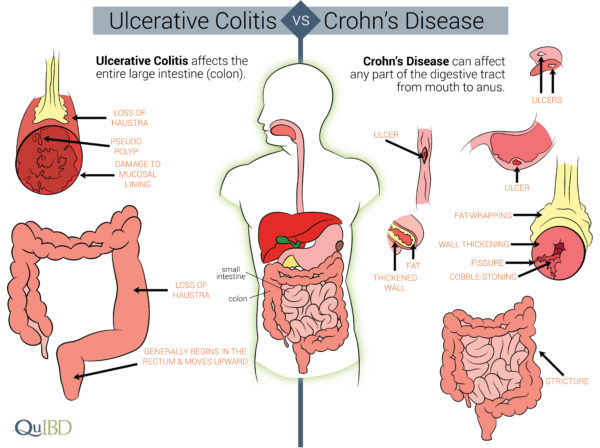I see so many posts from people who don’t know which type of IBD they have or saying they have both – which just is not possible! I thought I would do a post to explain the two diseases and the differences between them. I understand how confusing diagnosis is, and the doctor’s often don’t do anything to help so this will hopefully clear up some mis-information.
Disclaimer – I am a Crohn’s Disease patient and keenly question my doctor’s and do research. I am not a medical professional.

Diagnosing IBD
To diagnose a person with IBD, various tests are usually carried out. These include:
- Blood tests – doctors will especially want to look at your CRP levels, this is the level of inflammation in your body. On it’s own a blood test is not enough to diagnose IBD. Some people’s levels remain low even when they are flaring, myself included, and they can be raised because of injuries to the body for example.
- Faecal Calprotectin – it is time to poo in a cup! The levels of faecal calprotectin (which raise due to inflammation in the bowel) are determined by testing a stool sample. Although more reliable than a blood test, further tests still need to be done for a definitive diagnosis.
- Colonscopy – this test involves a small camera being inserted into your bottom so the doctor can see inside the large bowel (and occasionally they are able to see the beginning of the small bowel too). The test can be done with or without sedation and is the one way you will get a definite diagnosis of IBD. Biopsies can be taken during the procedure and will be sent to the lab to test for inflammation and may also be able to determine which type of IBD you have.
- MRI – AN MRI scan may be done to check how far up the digestive system you have inflammation. You may need to drink a prep solution so your digestive system is highlighted y the scanning equipment and you may have a bowel relaxant and contrast dye administered by an IV during the test to help get the best possible images.
- Endoscopy – if you are having issues with your stomach, the doctor may want to check this out with an endoscopy. This test involves a small camera going down the throat and into the stomach so photos and biopsies can be taken as needed. The test can be done under sedation or using a throat numbing spray.
Following a diagnosis of IBD you may be told you have Crohn’s Disease, Ulcerative Colitis or Indeterminate Colitis. Indeterminate means they are not sure which one it is and they will want to await further test results such as biopsies.
IBD – Inflammatory Bowel Disease
Both Crohn’s Disease and Ulcerative Colitis are types of IBD. They also share some symptoms such as:
- Abdominal Pain
- Diarrhoea
- Nausea
- Vomiting
- Weight Loss
- Fever
- Fatigue

Crohn’s Disease
So what makes Crohn’s Disease different from Ulcerative Colitis?
- Crohn’s can affect the whole digestive system from mouth to anus. Not everyone will be affected in every area, about 5% of Crohn’s patients are.
- Crohn’s Disease affects all the layers of the intestinal wall and patches of inflammation can be seen throughout the GI tract.
What Is Crohn’s Colitis then? Does that mean I have both?
No! Crohn’s Colitis means you have Crohn’s Disease that is active in your large bowel

Ulcerative Colitis
Many people will say they have colitis but that word just means inflammation in the large bowel, which people with Crohn’s have too. The actual disease is called Ulcerative Colitis and it is different from Crohn’s in a couple of ways.
- UC affects the large bowel only, starting in the rectum. The perianal area isn’t usually affected by UC but not always.
- UC only affects the innermost lining of the intestinal wall and rather than patches, normally affects the whole length of the large bowel
Some people may be diagnosed with Ulcerative Colitis and then at a later date, have this changed to Crohn’s Disease. This doesn’t mean you have both either. It just means when your disease was first diagnosed it was probably contained to the large bowel. Biopsies, or the disease spreading further up the GI tract may confirm it is Crohn’s Disease as opposed to UC though.
I hope this helps you all, especially those who haven’t had this properly explained to them. It may also be a good source of information to those not affected by IBD and just like to learn. Let me know about your diagnosis in the comments. Was there some confusion about what you had? I definitely thing the diagnostic appointments could be handled a lot differently – I know mine was shocking!
















Leave a comment